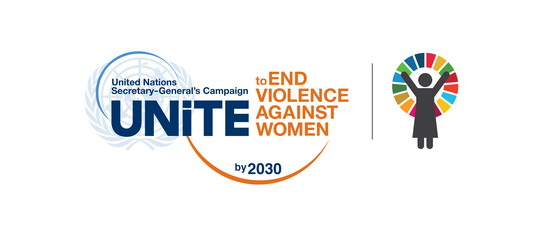
Every year, around the world, 25 November marks the start of the 16 days of activism against gender-based violence (GBV). This global campaign aims to commemorate the victims of GBV, to celebrate the survivors, raise awareness and trigger actions on this pervasive human rights violation and global health issue.
However, 2020 is not just another year; the COVID-19 pandemic changed our lives forever.
As the world locked down as part of the control measures to address the rapid spread of the infection, women's organizations and the media started reporting an alarming rise in domestic violence and abuse against women and children. In the Eastern Mediterranean Region, which has the second highest prevalence of violence against women globally (37.7%), an increase of 50–60% in cases has been recorded based on survivors’ calls for help to women’s organization hotlines. This increase was coupled with a challenge in ensuring the continuation of the essential services that survivors need.
“The disruption [due to the pandemic] has created new interests and demands, …rates of domestic violence against women and children have increased by as much as 60%”
Dr Ahmed Al-Mandhari, WHO RegionalDirector for the Eastern Mediterranean
COVID-19 and GBV are interrelated pandemics
The health impacts of violence, particularly intimate partner/domestic violence, on women and their children, are significant. Violence against women can result in injuries and serious physical, mental, sexual and reproductive health problems.
The role that the health system can play to prevent and respond to GBV is key, including in health emergencies. Surveys conducted by the Health Clusters in Afghanistan, Iraq and Somalia, between April and May 2020, to measure health service utilization by GBV survivors during COVID-19, showed a 45% percent increase in GBV. This included disclosures of intimate partner violence, sexual exploitation and abuse, harassment, and other forms of GBV than prior to the COVID-19 outbreak.
In Iraq, approximately 47% percent of GBV survivors sought health services during the COVID-19 epidemic to avail mental health and psychosocial support (MHPSS) services. Mental and emotional abuse was commonly associated with incidents of intimate partner violence. In Somalia, the survey’s findings highlighted an increase not only in domestic violence, but also of sexual violence against girls, along with a concerning upsurge in female genital mutilation (FGM). In Afghanistan, health partners that provide specific GBV services, reported an increase in requests for treatment of injuries as well as psychosocial support as result of domestic violence.
“Despite lack of data in Afghanistan, emerging evidence shows that, with the COVID-19 crisis, the number of women and girls experiencing violence, more particularly domestic violence, has increased in all provinces of Afghanistan” (Gender Alert on COVID-19 in Afghanistan, May 2020)
Gender-based violence is preventable and its devastating effects can be contained
While recognizing that health systems are overstretched with the COVID-19 response, and are under enormous pressure, it is also important to underline that health services can still support GBV survivors by ensuring the continuity of life-saving services and establishing referral linkages in order to connect survivors with other available services.
Initiatives have thus been undertaken at country level to address the continuity of services and reach out to women and girls in need of support. Medical services have also had to adapt in order to be administered remotely where possible.
In Afghanistan, WHO has drafted a guidance note for Afghanistan’s women's protection centres operating during the COVID-19 pandemic, in partnership with UN Women. Furthermore, the health response to GBV during the COVID-19 pandemic has been integrated in WHO's emergency training of almost 100 health care providers from different parts of the country to ensure that the issue is taken into account in their practice.
In Iraq, guidance has been produced by WHO for both remote and face-to-face services for the health care of women who may have been subjected to violence. This has included the development of an updated referral pathway for each governorate. Online training has also been undertaken for frontline workers from the Ministry of Interior and the Ministry of Defense on GBV and COVID-19.
In Lebanon, face-to-face support has continued for high-risk cases during the lockdown, observing all COVID-19 related safety precautions. Remote case management has been put in place, aiming to establish safe, strong and flexible communication lines with survivors living in confinement with their aggressors.
In Pakistan, WHO has integrated COVID-19's intersections with GBV into the GBV training curriculum and communication/awareness-raising materials to strengthen the provision of GBV-related clinical management, psychosocial support services and the referral of survivors and populations in need during the pandemic response. Capacity-building of health providers has been conducted in the high risk/burden provinces of Pakistan, including specialized training for gynaecologists to integrate GBV response ino their services during the COVID-19 pandemic. Furthermore, in order to prepare the health system GBV response for the second wave of the COVID-19 pandemic, WHO is introducing GBV-specialized telemedicine support and health-related services in collaboration with the Institute of Psychiatry in Balochistan.
Against this backdrop, the 16 days of activism reminds us that the health system and humanitarian actors have a core role and stake in preventing violence from happening and in responding to survivors by providing life-saving health care, even in a time of health emergencies such as the current COVID-19 pandemic.
“There is never any excuse for violence. We abhor all violence, of all forms, at all times”
Dr Tedros Adhanom, WHO Director-General
#ENDViolence against women!
Useful links
16 Days of Activism against Gender-Based Violence
RESPECT women: preventing violence against women
Updated guidelines on violence against women
Iraq flow chart for health services for GBV during COVID-19, April 2020
Guidance for women's shelters in Afghanistan:
Guidance note for women protection centers operating during the COVID-19 pandemic


